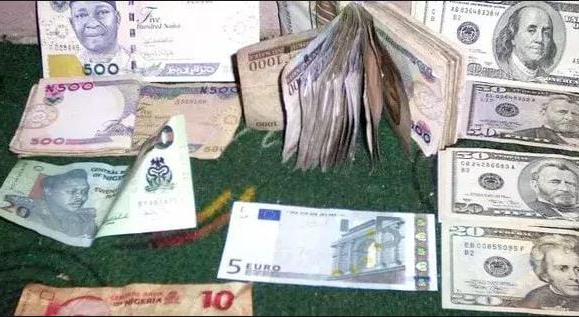Naira strengthens at official forex market, flat at parallel segment

Following the appreciable closing rate of Naira at 306 per dollar on the last trading day in 2017, the Nigeria’s currency on Tuesday, first official foreign exchange trading activities in 2018, extended gaining streak to close at 305.50 per dollar, Central Bank of Nigeria (CBN) data has revealed.
As at close of yesterday trading activities, the Naira at the parallel market, remained flat over the dollar at N363 against the Dollar.
The 305.50 closing rate of the local currency to a dollar at the official forex market on Tuesday, represents the fourth consecutive gaining day, after appreciated to 306.10 last Wednesday December 27, 2017, which was stronger than N306.15 traded earlier.
The Naira, continued to appreciate over the dollar as it closed last Thursday in 2017 at a better rate of 306.05 before closing the year at 306 to the Greenberg.
l
The local currency has being on steady gain against the US dollar and with yesterday closing rate, there are indications that the Nigeria’s currency may continued in its gaining streak in 2018 agianst the US Dollar and the two other major foreign currencies.
The Naira at parallel market against Pound Sterling appreciated while against the Euro, it remained flat.
On the sell side, naira against the Pound Sterling closed at N482 on Tuesday from N484 traded on Friday, but closed trading to N426, the same rate it closed last year.
The Investors and Exporters (I&E) foreign exchange window opened at N360.05, traded high at N362.00 and eventually closed at N361.00.
According to FMDQ OTC, a total turnover of $200.36million was transacted through the I&E foreign exchange window on Tuesday.
At the Investors and exporters (I&E) FX window, the Naira started trading low at 360.08 against N360.05, per Dollar on Thursday and N359.85 that stood on Wednesday, but closed at a better rate of 360.33 on Friday compared to 360.60 exchanged a day earlier and 360.70 recorded on Wednesday.
The Investors FX window, however, recorded total transacted turnover of $200.36 million on the last trading day of 2017.
Foreign exchange traders, however, believed that the Nigeria’s local currency will be stable in the first trading week of 2018, in anticipation that the apex would continued support the Naira through its regular interventions of injection of dollars into the market.
However, analysts at Investment one said, “Going into the New Year, we expect improving oil production and the on-going rebalancing of the global oil market to be supportive of CBN’s foreign exchange intervention sales and the Naira.”
Meanwhile, the Nation’s foreign exchange buffer added $12.9bn or nearly 50 per cent in 2017, amid weekly intervention by the apex bank.
The foreign reserves monitored by CBN opened 2017 at $25.84 billion and grew to $38.73 billion as at December 28, 2017.
The foreign exchange had reached its bottom at about $23.6bn in October 2016 from as high as $40bn in January 2014.
In September 2008, Nigeria’s foreign exchange Reserves hit $62bn, with federal government spending $12bn to settle external debts.
The CBN governor, Mr. Godwin Emefiele in November said, “It is my belief that if we remain resolute with our efforts, policies and actions we can attain an foreign exchange reserve position of about $40bn by end 2018.”
Emefiele in December disclosed that the nation’s foreign reserves had risen to $38.2bn, the highest in 39 months.
l
Finance analysts said Nigeria’s foreign reserve ought to have crossed the $40bn mark in 2017; but impinged by CBN’s creation of special windows to tackle instability in the foreign exchange market.
They believed that this development is renewing confidence that the 2018 foreign reserves target of the CBN put at $40bn is achievable, as the apex bank steps up its management of foreign exchange earnings.
They expressed that steady increase in the global oil prices, had contributed to the appreciation recorded in the nation’s foreign reserves, as international trade also impacted on the foreign exchange buffer of the apex bank.
In November, 2017, the Federal Government of Nigeria raised total sum of $3bn through Eurobonds, which was oversubscribed by about $11bn and split across 10-year and 30-year tranches at issuance yield of 6.5 per cent and 7.625 per cent, respectively.
Also, increased inflow from Diaspora remittances has also being said to have contributed immensely to the Africa’s largest economy foreign reserves.
The breakdown of the latest figure showed that the reserves in just one month gained total sum of $3.8bn, between November 30, 2017 closing figure of $34.9bn and December 28, 2017 balance figure of $38.7bn.
The CBN latest statistic showed that a week earlier, as of December 22, the Nigeria’s foreign reserves stood at $37.92bn, represented 10.1 per cent from a month earlier.
But stood at $34.53bn as of November 24, up nearly 3 per cent from a month earlier, with a balance of $33.58bn at the same date in October, represented 40.5 per cent while compared to the balance in the corresponding period in 2016.
Earlier this year, oil prices slumped on concerns that rising crude production from Nigeria, Libya and elsewhere would undermine output cuts led by the OPEC and Russia. But prices have rallied nearly 50 percent since the middle of the year on robust demand and strong compliance with the production limits.
Foreign reserves at $33.83bn, it has reached a two-half year high this year amidst foreign exchange intervention put in place to the various exchange markets by the CBN.
For the third quarter of 2017, the external reserves gained $7.53 billion or 29.2 per cent from $25.8bn it opened January to $33.33bn, the highest in almost three years.
CBN spokesman, Mr. Isaac Okorafor, had noted the increase in foreign reserves can be attributable to peace in the oil-rich Niger-Delta region of the country, which resulted into increased oil output and earnings.
He had said with the sustained interventions, the apex bank has been able to push foreign exchange demand away from the parallel market into the formal regulated market.
In the second quarter, the oil sector grew significantly by 17.04 percentage points from -15.40 per cent recorded in Q1 2017 to 1.64 per cent, reflecting the relative peace in the Niger Delta, increased oil output from the region and increase in oil prices.










